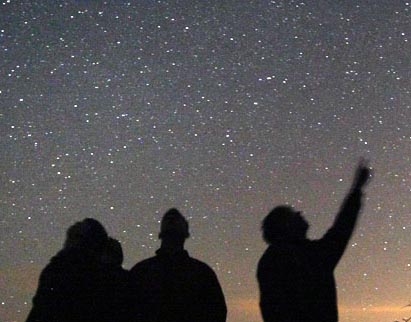Al-Bukhaaree recorded in his Sahih that: “Qataadah said: ‘Allah created these stars for three purposes; as ornaments of the heavens, missiles against the devils and as signposts used for navigation. Whoever interprets otherwise is mistaken, loses his reward and burden himself with that he has no knowledge about.” [1] End of quote.
Qataadah disliked learning the lunar phases while Ibn Uyaynah did not sanction it. Harb cited that from both of them.
But Ahmad and Ishaaq allowed studying the phases.
COMMENTARY
His saying regarding the narration from Qataadah – رضي الله عنه -: “Allah created these stars for three purposes”; (The letter) laam (in lithalaath – for three purposes- as it occurs in the Arabic text), expresses reason: i.e., to explain the reason and the wisdom.
His saying: “for three purposes”, lithalaath: it is allowed as well to say, lithalaathatin (i.e., with an increment of the letter taa in the Arabic text). However, to say, lithalaath is better; meaning, for three Hikam (reasons) and so, the taa indicating the feminine gender (in lithalaathatin) was removed from the number.
And the three purposes are:
One: As ornaments for the sky. Allah – the Mighty and Sublime – says:
ۖ وَلَقَدْ زَيَّنَّا السَّمَاءَ الدُّنْيَا بِمَصَابِيحَ وَجَعَلْنَاهَا رُجُومًا لِّلشَّيَاطِينِ
“And indeed We have adorned the nearest heaven with lamps, and We have made such lamps (as) missiles to drive away the Shayatin (devils).” (Mulk: 5).
This is because if one looks at the clear sky during a moonless night without electricity he will find these stars to be of profound beauty the extent of which is known to Allah – the Mighty and Sublime – alone. It will seem like a thicket decorated with different kinds of shinning silver. A big bright star will tend towards being reddish, another bluish; that will be light (in colour) and another in the intermediate: this is something clearly observed.
Can we say that: the apparent meaning of the noble verse is that the stars are studded into the heavens: or do we say: that is not necessarily so?
The answer: It does not necessarily imply that the stars are studded into the heavens. Allah, the Exalted says:
وَهُوَ الَّذِي خَلَقَ اللَّيْلَ وَالنَّهَارَ وَالشَّمْسَ وَالْقَمَرَ كُلٌّ فِي فَلَكٍ يَسْبَحُونَ
“And He it is Who has created the night and the day, and the sun and the moon, each in an orbit floating.” (Anbiyaa:33)
That is, each of them revolves; each has its own orbit.
I saw it with my own eyes once that the moon eclipsed one of the stars; it covered it. This was one of the huge shinning stars which used to stay near the moon at the end of the month. So, close to dawn, it covered it and so, we could not see it again. This was two years ago towards the end of Ramadan.
Thus they are orbits varying in their altitude and deepness; they are not necessarily stuck in the sky.
If it is said; So, what is the answer to Allah’s statement: “We have adorned the nearest heaven”? We will say: that a thing is decorated with another does not necessarily mean been stuck in it. If a man builds a palace and places huge beautiful electric light-effects around it away from its wall; whoever views this palace from a distance would find that the lights-effects decorate the palace even though they are not embedded into it.
The second: As missiles against the Shayatin (devils): that is, the devils among the jinns; not those among the humans since the devils among humans cannot reach it; but devils among the jinns do. They have greater abilities than devils among humans; they have tremendous abilities. Allah – the Mighty and Sublime – says about their actions indicating their ability, that:
وَالشَّيَاطِينَ كُلَّ بَنَّآءٍ وَغَوَّاصٍ
“And also the Shayatin (devils) from the jinns (including) every kind of builder and diver.” (Saad: 37).
That is, we made them subservient to Sulayman – peace be upon him.
وَءَاخَرِينَ مُقَرَّنِينَ فِي الأَصْفَادِ
“And also others bound in fetters.” (Saad: 38).
And Allah the Exalted says:
قَالَ عِفْرِيتٌ مّـِنَ الْجِنِّ أَنَاْ ءَاتِيكَ بِهِ قَبْلَ أَن تَقُومَ مِن مَّقَامِكَ وَإِنّـِي عَلَيْهِ لَقَوِيٌّ أَمِينٌ
“An Ifrit (strong) from the jinns said: “I will bring it to you before you rise from your place …” (Naml: 39).
That is, from Saba (Sheba) to Shaam (Ancient Syria); and it was a mighty throne belonging to the Queen of Saba. These indicate their power, quickness and high sense of implementation. Allah says – the Mighty and Sublime:
وَأَنَّا كُنَّا نَقْعُدُ مِنْهَا مَقَاعِدَ لِلسَّمْعِ ۖ فَمَنْ يَسْتَمِعِ الْآنَ يَجِدْ لَهُ شِهَابًا رَصَدًا
“And verily, we used to sit there in stations, so (steal) a hearing, but any who listens now will find a flaming fire watching him in ambush.” (Jinn: 9).
Ar-Rajm means throwing.
The third: Signs are used to chart direction: that is taken from Allah’s saying – the Mighty and Sublime:
وَعَلاَمَاتٍ وِبِالنَّجْمِ هُمْ يَهْتَدُونَوَأَلْقي فِي الاَرْضِ رَوَاسِيَ أَن تَمِيدَ بِكُمْ وَأَنْهَاراً وَسُبُلاً لَعَلَّكُمْ تَهْتَدُونَ
“And He has affixed into the earth mountains standing firm, lest it should shake with you, and rivers and roads, that you may guide yourselves. And landmarks (signposts, etc. during the day) and by the stars (during the night), they (mankind) guide themselves.” (An-Nahl: 15-16).
So, Allah – the Exalted – mentioned two things by which navigation is made:
One: Things that are earthly; including all landmarks Allah has placed on the earth like mountains, rivers, paths, valleys, and so on.
Two: Those in the sky; as in Allah’s saying: “And by the stars (during the night), they (i.e., mankind) guide themselves”.
An-Najm (the stars here) is a generic name including all those employed for navigation; it is not specific to a particular star because every human community has a way of using these stars to locate directions; whether the directions of the Qiblah or location; whether on the land or on the sea. This is among Allah’s bounties, that He made the signs – the stars – higher up, without anything blocking them. This is because during the night, you may not be able to see any mountain nor valley; and this is from Allah’s control. He the Exalted says:
وَسَخَّرَ لَكُمْ مَا فِي السَّمَاوَاتِ وَمَا فِي الْأرْضِ جَمِيعاً مِنْهُ
“And has subjected to you all that is in the heavens and all that is in the earth.” (Jaathiyah:13).
His saying: “Qataadah disliked learning the lunar phases”: That is, by way of prohibition, considering the fact that “dislike” in the parlace of the pious predecessors would mean prohibition most times.
His saying: “…learning the lunar phases” could imply two things:
One: that it means knowing the lunar phase. The night could be in two halves and it may be full. What is intended here is to study the lunar phases every night because all nights have their phase until completes twenty-eight and on the 29th and 30th, it will not appear in most cases.
Two: that what it means is studying the movements of the stars; such as that: so-and-so star will appear so-and-so day. And these stars, Allah has made them indicators of the seasons because they are 28 stars; 14 are north-ward and south-ward; when the sun reaches the northern phases, there will be hotness (on earth), and when it reaches the southern phases, there will be coldness. Thus from the signs of the approach of the cold season is appearance of (the star called) Suhayl (Canopus) which is one of the southern stars.
His saying: “..while Ibn Uyaynah did not sanction it”: He is the well-known Sufyaan bin ‘Uyaynah, and his statement concurs with Qataadah’s view of dislike.
His saying: “Harb cited that”; one of the students of Imam Ahmad, he reported lots of Issues from him.
His saying: “Ishaaq”: he is Ishaaq bin Raahawahy – رحمه الله .
The correct view, however, is that there is nothing wrong with learning the lunar phases because it does not involve joining partners with Allah except if it is studied to include rainfall and the coming of the cold season; that it brings about these things. Then, that constitutes an aspect of Shirk. But as for merely deducing the seasons with it whether is it spring or autumn or winter, there is nothing wrong with this.
Source from commentary on Kitab At-Tawheed Volume 2 page 11-15 explained by Shaykh Muhammad bin Salih Al-‘Uthaimeen
1 He collected it in a Muallaq form with affirmation: Al-Bukhaaree (Book of Beginning of Creation, Chapter on Stars, 2/42)

